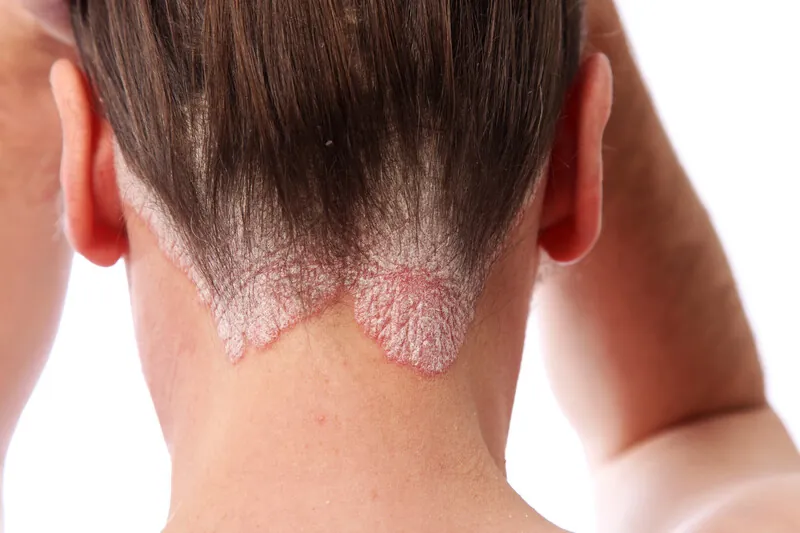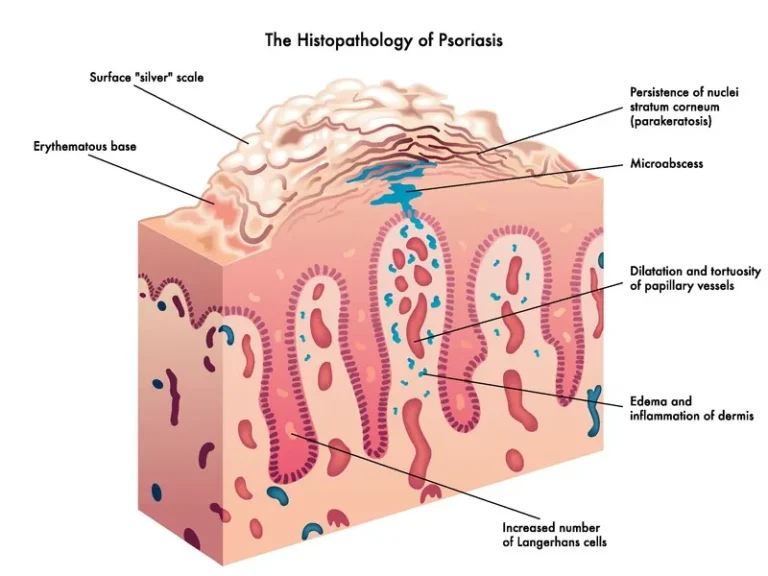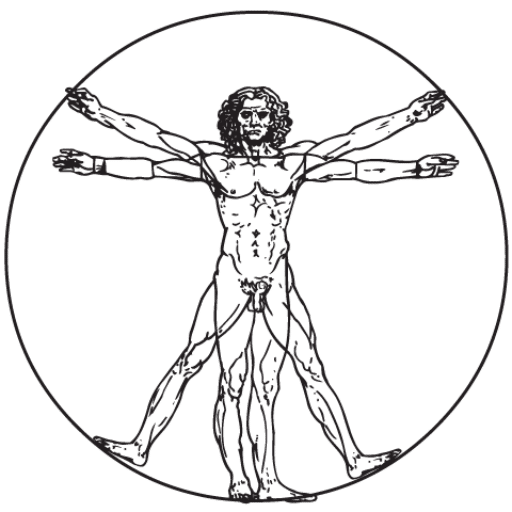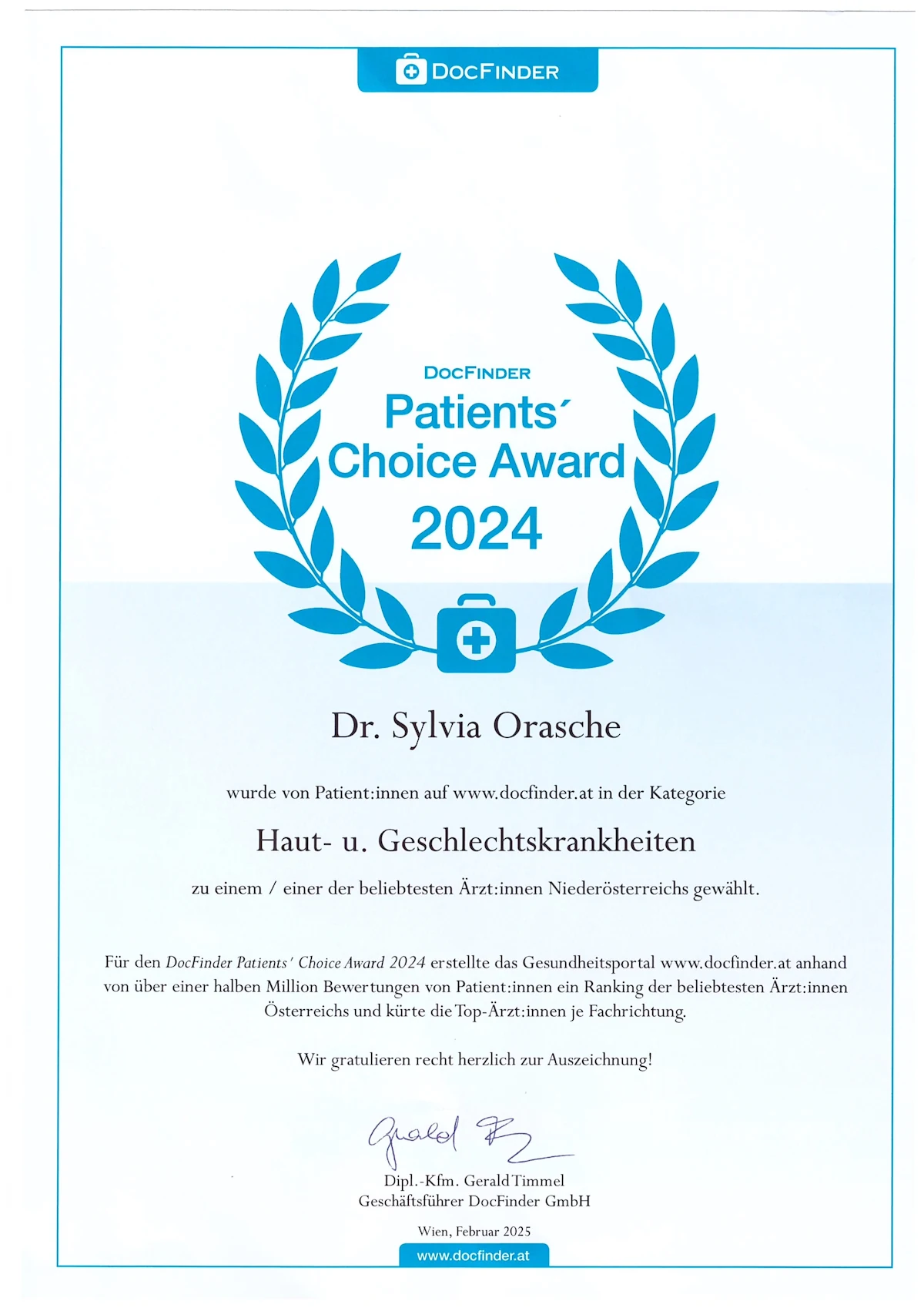Psoriasis Treatment Vienna
Psoriasis treatment Vienna or in Tulln at Dr. Sylvia Orasche.
Psoriasis is an autoimmune disease and, although it cannot be cured, it can be treated well under specialist supervision. The treatment of psoriasis requires an individualised and often combined therapeutic approach in order to effectively manage the symptoms and improve the quality of life of those affected.

Table of contents
What is psoriasis?
Psoriasis is an inflammatory disease of the skin that is not contagious. In this chronic autoimmune disease, the immune system attacks the body's own healthy skin cells, which it mistakenly sees as foreign. As a result, too many new skin cells are produced too quickly.
Psoriasis is characterised by scaly skin lesions with slightly raised patches that may itch. These are often covered by silvery-white scales called plaques. The plaques usually appear on elbows, knees, the small of the back or abdomen, in the folds of the buttocks, on the hairy head or behind the ears. More rarely, psoriasis appears on the face, on the fingers, the soles of the feet or in the intimate area. In severe cases, the inflammation of the skin spreads over several regions of the body.
The disease itself cannot be cured, but psoriasis can be treated well under specialist supervision and thus become symptom-free for a long time.
Dr. Christian Orasche is a specialist in psoriasis treatment and is familiar with the latest form of therapy using biologics.
Psoriasis Causes
The exact cause is not known, but psoriasis is now classified as an autoimmune disease. Various trigger factors play a role in the development of psoriasis:
- Genetic predisposition
- Infections with streptococci
- Stress and great strains
- Hormonal imbalance (puberty, menopause)
- Injuries to the skin (burns, cuts)
- Certain medicines (beta blockers, ACE inhibitors,
- Statins, interferons, painkillers)
- Mechanical irritation (pressure, scratching)
- HIV infection
Psoriasis is divided into different forms depending on the age at which the first symptoms appear.
The early type (known as type 1 psoriasis) occurs before the age of 40 and is the most common type of the disease, with most people developing the disease between the ages of 16 and 22.
The late type, also called type 2 psoriasis, affects people over 40, with most people getting the disease between 57 and 60 years of age and usually showing milder symptoms than the early type.
Forms of psoriasis:
- Psoriasis vulgaris: most common form, affects 90 % of cases
- Psoriasis inversa: inflammation in body folds, such as the armpits.
- Pustular psoriasis: (with painful blisters)
- Psoriasis guttata: (pinhead-sized foci of inflammation)
- psoriatic erythroderma: (severe inflammation with large areas of reddened skin)
Course
Psoriasis usually progresses in episodes with sometimes more severe, sometimes milder skin problems. Psoriasis cannot yet be cured, but it can be treated well by an experienced dermatologist.
The superficial skin flakes can be easily removed.
However, if deeper layers of scales are scraped off, punctiform bleeding of the skin occurs, which is known as 'Auspitz phenomenon' is referred to.
Diagnosis of psoriasis
The diagnosis of psoriasis is usually determined by a physical examination. In unclear cases, a skin biopsy can provide information. Dr Christian Orasche has a high level of expertise in the diagnosis and treatment of psoriasis.
Psoriasis therapy options
Successful psoriasis treatment usually consists of a combination of therapy options:
Psoriasis treatment Vienna with external preparations:
Regardless of the severity of the disease, adherence to daily skin care with moisturising and nourishing creams or ointments is the most important part of treatment. For patients with a mild form of psoriasis, good results are achieved with topical therapies (local therapies), mainly with cortisone or vitamin D3 preparations applied to the skin. These substances are meant to curb the excessive growth of skin cells and have an anti-inflammatory effect. Creams or ointments containing urea or salicylic acid help the skin retain moisture.
Systemic therapies for the internal treatment of psoriasis:
In cases of severe psoriasis, anti-inflammatory drugs are used to treat psoriasis, which slow down or stop the progression of the inflammatory process. They are either ingested or injected. This treatment approach is known as 'systemic therapy'. Substances that suppress the body's autoimmune reaction are available for this purpose:
Immunomodulators:
Immunomodulators, such as ciclosporin or acitretin, regulate the excessive reaction of the immune system. However, these are rarely used any more.
Biologics:
These are biotechnologically produced protein substances that block certain pro-inflammatory messenger substances (cytokines). Examples are:
- TNF-alpha inhibitors: These are antibodies that curb inflammation. TNF-alpha inhibitors include the active substances adalimumab, etanercept and infliximab.
- Interleukin antibodies
The messenger substances interleukin-17 and 23 are involved in inflammatory reactions that also occur in psoriasis. The active substances produced, secukinumab, ixekizumab and brodalumab, intervene in the interleukin-17 regulatory circuit. Ustekinumab, guselkumab, risankizumab and tildrakizumab interfere with the interleukin-23 regulatory circuit. All substances are biotechnologically produced antibodies and inhibit the autoimmune reaction.
Photo-brine and laser therapy:
Phototherapy:
In light therapy, the affected skin areas are irradiated with UV light. The light inhibits the inflammatory reactions in the skin.
Balneo-phototherapy:
In order to intensify the effect of the treatment with UV light, the irradiation is only carried out after a salt water bath.
Brine therapy:
Brine from underground reservoirs containing 30 % of common salt is used. The brine dissolves inflammatory substances from the skin and thus alleviates the symptoms.
Laser therapy:
The Laser therapy is particularly suitable for smaller areas. The laser light is focused on the diseased skin areas.
Tips if you suffer from psoriasis:
1. pay attention to protection and care of the affected skin:
- Avoid long, hot full baths and rather take short showers with lukewarm water to prevent further drying of the skin.
- Use mild cleansing products that do not contain perfume, dyes or preservatives.
- Apply moisturiser regularly - lotions with urea, glycerine or vitamin E can be moisturising.
- Try to avoid styling products and do not dry your hair with a hair dryer if your scalp is affected.
- A short stay in the sun can be beneficial, but always use good quality sunscreen to protect yourself from sunburn during longer stays outdoors. Ask your dermatologist how much sun is good for your skin type.
- Consider using skin-friendly insect repellents to protect yourself from insect bites in summer.
2. become and stay active whenever and wherever possible.
3. pay attention to a healthy lifestyle
4. avoid stress: good planning can help reduce it and enjoy your time off from everyday life.
5. wear comfortable, air-permeable clothing made of natural materials to avoid additional skin irritation.
6. exchange information with other people affected. Psoriasis-Hilfe - Association and self-help group of psoriatics Austria.
Frequently asked questions about psoriasis
Will I pass on psoriasis to my children?
Scientists estimate that the probability of passing psoriasis on to children is 10 %. This probability becomes higher if both parents have psoriatic disease. But just because you have psoriasis doesn't mean your children will get it too. Genetics is not the only factor that determines whether you get psoriasis.
At what stage of psoriasis can I plan a pregnancy?
Speak up if you want to become pregnant or become pregnant unexpectedly.
A good time for pregnancy might be a phase of low or well-controlled disease activity.
A suitable treatment plan will be drawn up together with you.
Is there a psoriasis diet?
There is no specific psoriasis diet, but it is important to eat a healthy diet. Some foods can promote flare-ups. Take note of symptom exacerbations after eating and find out which foods to avoid.
In principle, the following applies: A healthy balance is the motto - the diet should be balanced and varied.
Note: Obesity, alcohol consumption and smoking can worsen the symptoms of plaque psoriasis and impair the effect of the treatment.
Is psoriasis curable?
Psoriasis is not curable, but it is very treatable.
Psoriasis Treatment Vienna
For an initial consultation in 1180 Vienna, please contact us: +43 1 470 0506 ordination@orasche.atPsoriasis treatment Tulln
For an initial consultation in Tulln, please contact us:
+43 2272 61 423
ordination@orasche.at
Patient testimonials
Dr. Orasche is not only extremely competent but also innovative - she has devices that are almost unique in Austria, such as the Fraxel laser, with which I had wonderful success!
Furthermore, she is very reliable, precise and extremely warm-hearted.
I also had Botox and hyaluronic acid done by her and she was extremely conscientious about these too. Likewise, the stitches she put in me were almost painless and without bruises in the days afterwards! It was really incredible!
I feel in wonderful hands when she looks after me - THANK YOU for letting me be your patient! It's nice that there are doctors like this, because they are actually angels!




